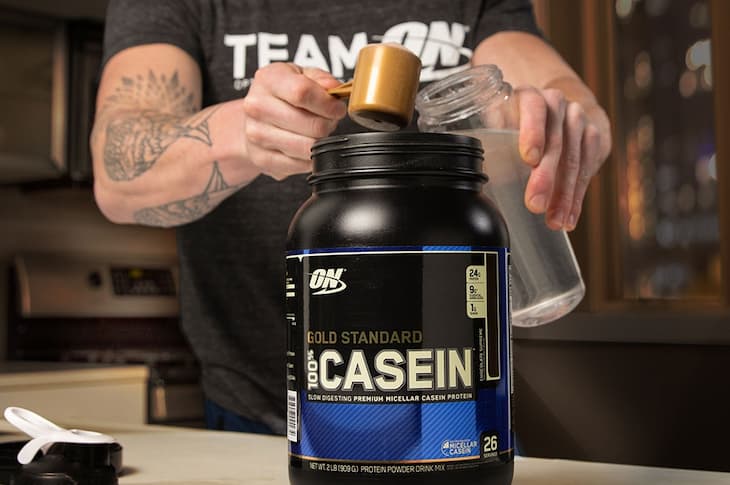Our body’s nutritional needs should be satisfied through our diet. However, the battle of two different nutrient sources, whole foods versus food supplements, can make some people question their dietary choices. While whole foods can provide you with the essential nutrients, dietary supplements can help you improve your workout results, gain muscle and strength.
To make the best of your exercising, you need to stick to high protein meals and build a healthy amount of muscle. Proteins serve some key functions to the human body, providing the basic structural components of muscles, blood, brain, nervous system, skin and hair. They’re essential for the balance between acid-base and fluid in the body and can help transport oxygen, vitamins, minerals and fats.

Source: Planned Property Management
Every protein consists of carbon, oxygen, hydrogen and nitrogen. Amino acids and are the building blocks of protein. When your body faces a negative caloric balance, which means your calorie intake is less than the amount you burn, the protein requirement is higher. Also, when your physical activity levels are higher, you need a greater amount of protein.
These days there are many different types of protein on the market, but two of them remained popular over the years – casein and whey. They’re both derived from the milk of different animals, most commonly from cow’s milk, casein is 80% of the milk, while whey is 20%. They’re both byproducts of cheese production, but still, they are different in many ways.
What Do You Need to Know About Casein Protein?

Source: Optimum Nutrition
Casein is a slow-digesting dairy protein and releases amino acids slowly. Micellar casein is the least processed version of casein, made by separating the casein protein from whey, fat and lactose in milk. You can choose micellar casein to help yourself maintain and steadily increase muscle mass and prevent the breakdown of proteins.
Casein protein is beneficial for muscle growth, fat loss and can help increase strength. It’s a complete animal protein and contains all the essential amino acids your body needs to function well. Also, it contains minerals such as calcium and phosphorus. It consists of five different caseins – alpha, beta, gamma, delta and kappa.
Micellar casein protein is comprised of all five of these casein types in a natural structure. Micellar protein supplements, when combined with resistance training, have been linked to greater strength and endurance, resistance training, better muscle gain and improved metabolic rates.
Casein is also known as a time-release protein because of its slow absorption rate in the gut. It releases amino acids slowly and is best absorbed throughout the night, benefiting your body’s protein needs over the 6 to 8 hours of rest. This means that it feeds your cells with amino acids at a low level over a long time and can increase protein synthesis and help muscle growth.
Casein provides other benefits to your body as well, such as antibacterial and immune benefits by reducing high blood pressure. According to some studies, it can reduce triglyceride levels and fight up the build-up of free radicals, thanks to the antioxidant effects that some of the peptides in a casein powder may have.
Casein and whey are extracted from the milk in different ways. In the cheese-making process, as milk is heated and enriched with different enzymes, the casein coagulates and forms curds. They’re made into cheese or added to dairy products, while whey separates into a liquid that can be washed, dried and made into a powder.
What Do You Need to Know About Whey Protein?

Sources: Men’s Journal
Whey is the liquid part of milk that separates during cheese production. Same as casein, whey is a complete protein as well, but it contains more branched-chain amino acids (BCAAs), including valine, leucine and isoleucine. However, the main difference between casein and whey is the rate of their absorption. Unlike casein, whey protein is ingested rapidly and according to some studies, it can increase leucine in the plasma almost right after consumption.
Whey consumption is more beneficial before or during workouts because it can stimulate higher muscle protein synthesis. Whey protein-based products can be a good choice as a post-workout snack as well. It can lead to immediate protein synthesis, which can help your recovery and stimulate muscle growth. Taking whey protein will increase your protein intake and can have major benefits for weight loss, too.
Whey is more than just a high-quality protein source as it contains other beneficial nutrients. Beyond muscle and strength, whey protein may provide many health benefits, such as lowering blood pressure, blood sugar and reducing symptoms of stress and depression. However, it’s important to keep in mind that if your protein intake is already high, adding whey protein may be unnecessary.
Choosing between casein and whey can be a difficult task as both have a high amino acid content. Whey is considered to be the more anabolic, or muscle building, milk protein thanks to its ability to rapidly spike blood amino acid levels. They’re essential for starting muscle protein synthesis. Casein, on the other hand, is known as an anticatabolic milk protein, so-called muscle-sparing protein, as it provides a steady stream of amino acids over some time. This way it keeps muscle tissue breakdown at bay.
Remember that for muscle growth, protein synthesis needs to be greater than muscle breakdown. So, whey increases proteins synthesis and casein prevents muscle breakdown, meaning they both, taken strategically, can help you build muscle.
Make sure to always consult your fitness trainer or health diet advisor and follow their instructions when choosing your supplements and read the product information and details before making a purchase.


















